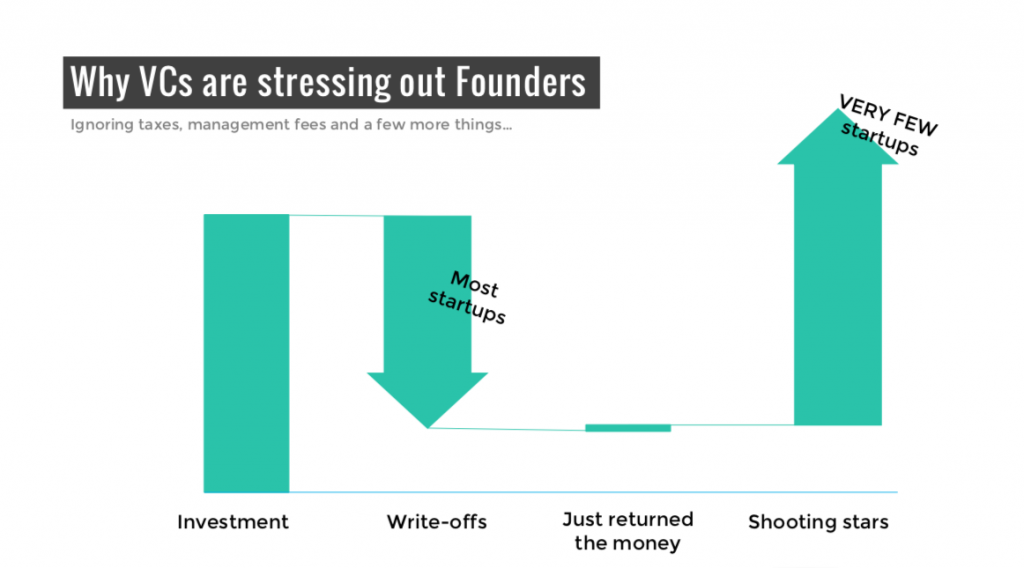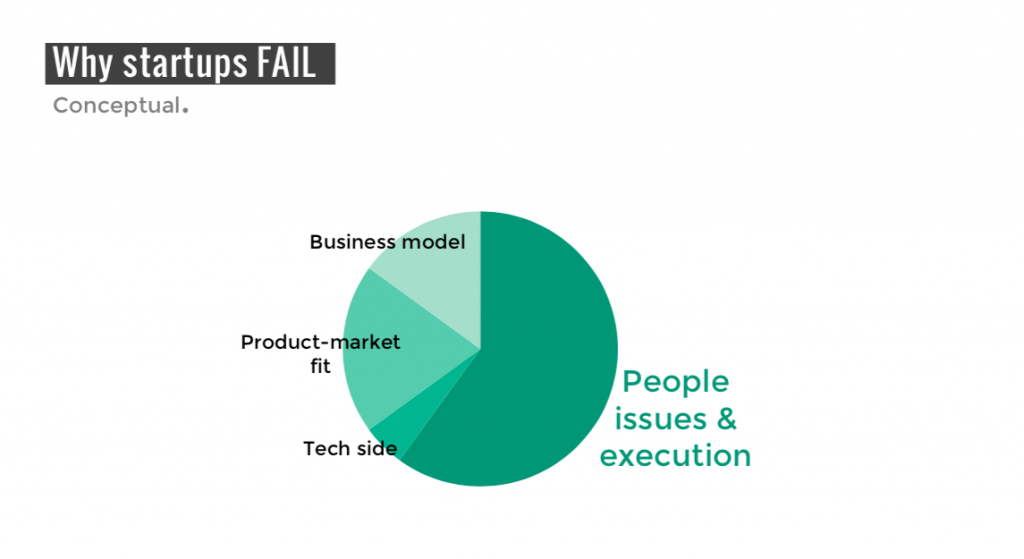How do team dynamics play to the advantage or disadvantage to venture-backed startups? How important is this “fluffy stuff” really?
At The Arc we are coaching dozens of teams, many times: Startup Teams! On 10th October 2017 the founder of The Arc, Astrid Schrader, was invited to Timisoara to speak at UrbanTalks, the startup conference by UrbanizeHub.*
Here are her insights from
years of startup coaching in a few simple messages!
“Startups” compare to “VC-backed startups” like “wacky” compares to “delirious”
VCs are notoriously stressed out. And that makes a lot of sense, because 8 out of 10 startups fail, or in their case: 8 out of 10 investments fail for them.
It’s very simple. 
Imagine you are a VC and you have invested 10 million Euros in 10 startups. 1 million each. Then 8 fail (to be conservative) or just about return the money. So essentially: 8 million gone.
Then the remaining 2 have to be sold at a price that is so high, so that they can earn back AT LEAST all the money for the other startups.
That means: Together the 2 startups need to be sold at minimum of 10 million Euros (2 x 1 million for their own investment + 8 x 1 million for all the other ones who lost the investment). That makes 5 million each.
Now imagine one more startup fails. So now the remaining startup has to be sold for 10 million (1 x 1 million for its own investment + 9 x 1 million for all the other failed startups).
Whether you fail or just return the money does matter but not crazily much to a VC. In both cases they have lost their investment.What they do care about greatly of course is, if you are turning into one shooting star! That’s when all eyes are on you…
…as you now could be the potential saviour to recoup all the money that has previously been lost. Does it now make sense that VCs are seldomly exhilarated, and mostly stressed out (and delegate that stress to their startups)? We hope it does.
So whilst the VC cares less whether you fail or just about return the money for founders this is very different. For you as a founder, making one million often times already seems crazy. But whether or not that turns into 10 million, seems like a luxury problem that you can deal with once it ACTUALLY arises.
What you DO greatly care about though is failure. Or to be more concise: In practice – whether you fail or just sold your company (even at meagre price) feels like a big difference. Whilst: whether you make 1 or 10 million at exit… sure, feels like a difference, but most people (trust me) are already fine, if they made “1 million only”.
Shortly: The emotional experience of founders who fail is terrible. For those who just returned their money it’s “naaaaw”. And for those who exited at 1 million or more than that find it easier to feel like they are on the winning side of life (#exceptionsprovetherule).
You might argue that – although you failed as a founder – it is still possible to raise investment again, but the psychological damage is unquestionable. Founders worry MUCH more about failure, because its consequences seem potentially so much more devastating.
Now go and drink that VC-startup-founder cocktail and you will experience what it means to ride a truck that is on fire and has no breaks.

So what’s the biggest reason for startup failure?
65% of all startup failure is due to misaligned co-founders (Noam Wassermann, Harvard Professor: The Founder’s Dilemma)
This couldn’t match our perception more. In our experience, too, is rarely about the technology, sometimes about product market fit or the business model, but in the vast majority:
Startups run out of cash because of misaligned, unclear or postponed decision-making resulting from people problems and execution f*** ups that are not properly dealt with internally.

It is:
- Growing too fast and only starting to think about structure once you have hit 30+ people!
- Hiring the wrong person and causing even more damage by clinging on to them for even longer!
- Waiting too long to open that one email you know will bring bad news! Uups! Double uups!
- Tragically: many problems are internal issues and often times avoidable. And we just don’t talk enough about how hard it really is to be a founder.
What role does the “fluffy team stuff” play?
Yes, the team matters. It’s the #1 thing that investors look at.
Yes, that means the skill set of the team. This is something which you can only change in the long run.
But it also means having clear responsibilities. Being ALIGNED! And the latter is what so many teams unnecessarily mess up.
If a lack of alignment is what matters, what would a remedy look like?
If people are not aligned, the problem is usually communication (duuh!). Or more precisely: People withhold information or opinions (for instance about the direction of the company or their own contribution to it). Certain areas will always “not be talked about” for fear the whole thing might explode.
And that’s usually a mistake.
One reason why communication is so hard is “triggers”. Trigger whaaat? Well, triggers are … the things that make you go on autopilot! The buttons which – if pushed – cause flashes of fear, shock, anger, worry… whatever it is your subconsciousness loves to mess around with. Actions taken from a triggered state are hence … often regretted later. And we shy away from tough conversations, from being radically sincere because we are usually triggered.
If TEAM is the #1 thing that can make or break a startup.
And if COMMUNICATION is the #1 thing that can make or break a team
…then what’s the best advice to have better communication?
Answer:
It is to manage your emotions.
So we have used the rest of this article to outlay the two most common emotions that are messing up teams.
And how to manage them.

What’s the problem with startups running on ANGER?
The first important trigger that so many startups are running on is anger.
Anger messes up a lot of teams in startups, because there is enormous pressure.
- It’s that entitled customer that makes you go into bitch mode, and … “boom” you’ve lost exactly that customer.
- It’s that co-founder who makes you go berserk, because in your eyes you just work so much harder than him, and … “boom” that’s the energy you transmit during your next pitch.
The truth is we are ruled by emotions but we often fail to acknowledge them in the room. Instead we believe that WE are the only one who is being hurt, anxious or has the right to be pissed.
Now, if that’s the kind of thing you observe yourself doing or if that’s the kind of feedback you are repeatedly getting, here’s a great question!
The question is: Who do you hate?
Not: WHAT do you hate? WHO!
If we ask for the “what” we tend to get boring abstract answer such as: “I don’t like arrogance.”
No, ask: “Who” do you hate? Your customers? Your investors? Your employees? Your co-founder? Your board? All of the above?
Who to do you hate and what exactly about it?
We ask, because the realization about what exactly we hate gives us great insights about what brings us out of control, what triggers us, what leads us to throw all our well-intentioned manners out of the window.
And the advice we have is very counterintuitive. We do not recommend to “meditate” until you are calm enough to swallow your anger. Nor would we encourage to express it wildly until you have “let go of some air”. #collateraldamage
Instead: We advise to sit with that feeling. And really listen tot it.
Stress comes from resisting emotions. And emotions are of such nature that – if you don’t listen to what they have to say to you – the only choice they have is to return with twice the force.
Anger asks you: What needs to be protected?
Which red line urgently needs to be drawn? Anger wants to point your awareness to boundaries that have been or are about to be crossed. Vague, directionless anger can mean that you haven’t defined your boundaries enough. Try to pinpoint: if my subconsciousness made perfect sense, what is it trying to tell me?
For instance: Are you angry with your product team, because they were late fixing that bug? Or are you angry about the fact that they only got to the office at 10:00 whilst you were there at 08:00 and as a result of that your malnourished self-care alarm system steps in saying: How dare you catching up on sleep whilst I am working early?!
There is a possibility that you are not angry about the bug. Because you can handle the bug with a calm and grace. So, it’s solved and it’s maybe even fine that it was solved late. But if you are burnt out, you can lose your composure over something as small as someone taking the break that you so badly want yourself.
You can see from this example that the smart answer to anger isn’t necessarily to lock your product team in, but to make a choice about how you are going to protect your own wellbeing from your inner workaholic.

What’s the problem with startups running on FEAR?
Another massive trigger in startups is fear.
Especially fear of failure.
Startups are reigned by this fear, because failure is
a) likely and
b) often times justified, because as Founder you constantly have do things or hire people for things you have never done before. You are essentially clueless.
In our experience though there are two very good antidotes to deal with fear (fear of failure in particular).
First of all: Fear, too, wants so ask you a question.
Fear asks you: What do I need to pay attention to?
Healthy fear (not: frenetic fear!) asks you to take reasonable, not ludicrous precautions.
So again, sit with that feeling. Even if it makes you uncomfortable.
Take your fear of failure for instance: What exactly are you scared of?
- That you are NOT a unicorn?
- That you have to file for bankruptcy?
- That AFTER your bankruptcy you will never get money again? And is it more the moment of rejection or the anxiety of the first call that you have to make?
- Or is it more personal stuff that freaks you out:
- That you have to lay off the friends who you hired and promised great things?
- That you will be broke personally?
- That you will disappoint your parents?
Once you understand what you are actually afraid of and what not so much answer the question:
A follow up question fear also asks you: How far am I prepared to go
Are you the kind of Founder who will put a mortgage on their house? Or will you quit your startup just before that’s happens and find a job?
This thought experiment is so powerful, because it puts you back into the driving seat on the search for a sane and safe exit. AND because you will likely realise that you are VERY VERY far from sleeping under a bridge.
Secondly: Fear might be the wrong thing to focus on
The question is NOT when failure is going to come. Or how bad it will really be?
Because…
- yes, you will have serious fuckups. You can be as careful as you want.
- you are probably at some point going to walk out of a room wanting to shrink to the size of the peanut. Because you have just said something insanely stupid.
- you are probably going to do something silly and unintendedly put your product launch or the relationship with a key client at risk.
Being in a startup means that by definition f****** up is part of your daily routine.
Yes, you can euphemistically call it “an experiment gone wrong” and you can talk about how you will learn from it, but if we are truly honest: the more reptilian parts of our brain still prefer the experience of success over the experience of failure.
Hence, the question is NOT when failure will come. Because it will!
The better question to ask is: When failure knocks on my door, who will I be? What kind of person do I choose to be? How will I inspire when the shit hits the fan?
What is a reaction that will inspire my team to walk through fire for and with me?
It’s hard to be a good leader when things are going well. And it is inspiring to be able to breath when everyone else around you freaks out.

So now you’ve got two major tweaks to protect you from the downside, the only remaining question for you is:
* For increased viewing pleasure the video has been edited – find the original version here.








